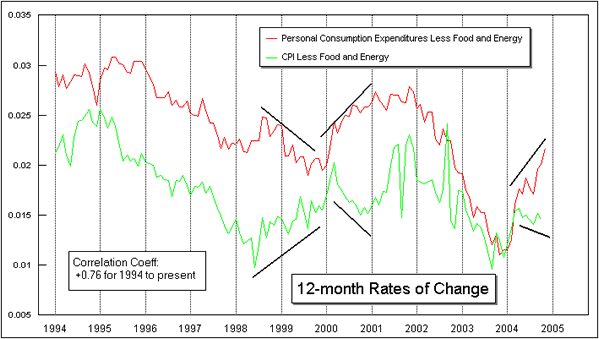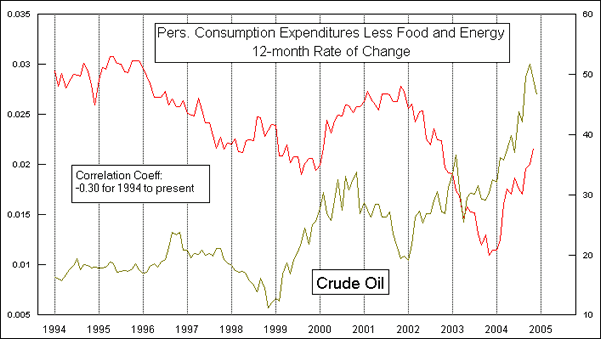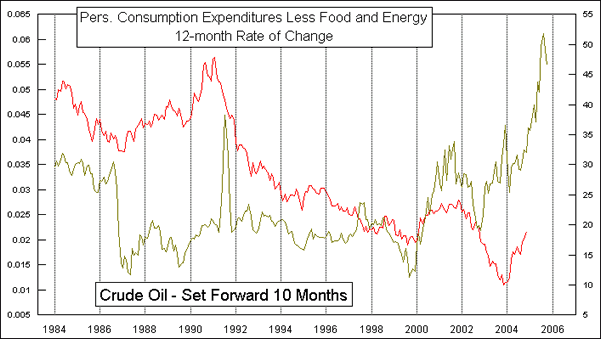Bond-Oil Headscratcher
Question (December 2004): Over the past several weeks, bond prices and crude oil prices have been seeing a positive correlation. This is somewhat counterintuitive, since higher oil prices tend to be inflationary, and inflation is the enemy of bond prices. But the last few days have seen that relationship beginning to change. Is this a case of bonds reverting back to their more typical relationship, or just a temporary anomaly in this new relationship?
I have been noticing that too. The somewhat perverse logic that has been offered in the MSFM (main stream financial media) to explain this phenomenon is that bond traders see rising oil prices as having an anti-inflationary effect (huh?!!), since higher oil prices will act like a tax on the economy, slowing down business activity. I suppose that higher food and transportation prices would also be anti-inflationary, according to this same logic. This is reminiscent of the whole Internet craze philosophy which said
that “earnings don’t matter”.

Well, I am going to have the whack the hornets’ nest again by proclaiming that what is common knowledge may not be correct. To start, I want challenge the notion that we were all taught in ECON 101, which says that if expenditures go down, so does inflation. This is the assumption underlying projections that higher oil prices should lead to lower inflation. Supposedly, people paying more for oil means that they have less money to spend on other things, and so the prices of those “other things” should go down because of that lower spending.
The premise underlying Wall Street’s “logic” about higher oil prices leading to lower inflation is not solidly founded. I created the attached charts to illustrate my point. The first chart compares 12-month rates of change in the CPI Less Food and Energy (CPILFE) versus Personal Consumption Expenditures Less Food and Energy (PCELFE). If people end up having to pay more for their energy, and if monetary expenditures are a zero sum game, then presumably they will spend less on PCELFE, and that should eventually drive down CPILFE. But it is hard to make the case that this thesis is true from looking at the data.
There is only a loose correlation between the two, and indeed they both may be coincidentally reflecting changes caused by some other agent. At times, there are dramatic divergences between the two, something that would not be explained under the aforementioned “logic”. The seemingly high correlation coefficient of +0.76 is largely attributable to the fact that both have trended generally lower during the study period, creating what statisticians refer to as “autocorrelation”. The behavior in 2004 (when this chart was originally created) clearly shows that the two can move in opposite directions, which throws cold water on the underlying assumption.

The second chart compares crude oil prices to PCELFE, and here the correlation is even worse. There are times when the two seem to move together, but the Correlation Coefficient of -0.30 says that it is not a real relationship. So if bond traders are believing that higher oil prices will steal money away from personal expenditures on iPods, on tube sox, and on GI Joe With The Kung Fu Grip, they may be mistaken.
In fact, the 3rd chart suggests that higher oil prices may actually lead to higher personal consumption expenditures. After looking at the chart for a while, I decided that the alignment of the patterns might not be quite right, so I set the crude oil price forward by varying amounts to see what would happen. This chart shows a 10-month offset, and the correlation is good enough to argue the point that higher oil prices drive up spending on non-energy items 10 months later.
Let me state that point again for emphasis: Higher oil prices lead to MORE spending on items other than food and energy, with a 10-month lag in that spending response.

So coming back to the original question about bonds versus oil prices… We are witnessing a breakdown in their once-good correlation. Whether this correlation breakdown is temporary or permanent, we don’t know yet. But as I have outlined above, it is not logical that bonds and oil should have a long-lasting correlated relationship, so perhaps Wall Street is finally coming to the realization that the “logic” which temporarily drove that correlation really is not valid.
It does not have to make sense to economists or to anyone else that life works this way. What ought to happen is that we should all examine our hypotheses, economic or otherwise, against what the data actually do, and then revise those hypotheses as the data show us is appropriate.